 Classes at Otaki Elementary School begin at 8:55 a.m., but once a week pupils come much earlier to weed the schoolyard or shovel snow around the school. The Middle School starts 10 minutes earlier and ends 20 minutes later. Besides classes, the students are assigned to raise animals or grow vegetables. A
Day at School (Elem) <= |
Otaki
Elementary
and Middle School
|
|
|
|
||
English Class
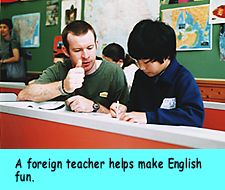
An English teacher living in the village, Australian Mark Stahnke, comes to lead classes at the Otaki School almost every day. Once a week, a British teacher is also sent by Nagano Prefecture for classes at the middle school, and the two join a Japanese instructor for team teaching. Beginning this year, one English class a week has been established for grades one to six, giving all students at the school exposure to native-English pronunciation.
|
||
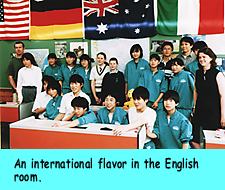 The
eighth-grade English class focuses on conversation, and resonates with
the sound of students' laughter. After practicing greetings and answering
simple yes-no questions to get their minds into English gear, the students
create and write sentences on the blackboard based on today's theme, "-ing."
Since there are only 18 students, everyone is assured of a chance to practice
his or her pronunciation. "We almost never open our textbooks. Classes
are fun, like a game," said one pupil. The
eighth-grade English class focuses on conversation, and resonates with
the sound of students' laughter. After practicing greetings and answering
simple yes-no questions to get their minds into English gear, the students
create and write sentences on the blackboard based on today's theme, "-ing."
Since there are only 18 students, everyone is assured of a chance to practice
his or her pronunciation. "We almost never open our textbooks. Classes
are fun, like a game," said one pupil.
|
||
Music Class
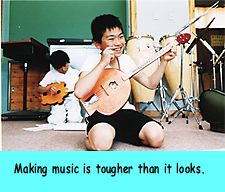 There's an active music
program at Otaki Elementary School. This is only natural, since many of
the kids own a bandore or violin that they've built with their own hands.
So they pour a great deal of energy into practicing. In the fifth-grade
music class, 3 students are finger picking their bandores, while 10 others
are bowing their violins. After tuning their instruments to the teacher's
piano, one student after another perform a piece.
There's an active music
program at Otaki Elementary School. This is only natural, since many of
the kids own a bandore or violin that they've built with their own hands.
So they pour a great deal of energy into practicing. In the fifth-grade
music class, 3 students are finger picking their bandores, while 10 others
are bowing their violins. After tuning their instruments to the teacher's
piano, one student after another perform a piece.
|
||
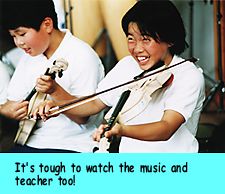 "Being able to play
an instrument I made myself is like a dream, I definitely want to become
good at it," says one student. Music classes at the Otaki School provide
students the opportunity to experience the pleasure of both making and
playing instruments.
"Being able to play
an instrument I made myself is like a dream, I definitely want to become
good at it," says one student. Music classes at the Otaki School provide
students the opportunity to experience the pleasure of both making and
playing instruments.
|
||
|
||
|
|
||

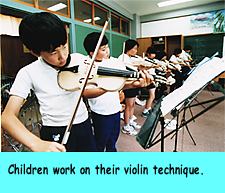 The class has a repertoire
of several dozen pieces, including such traditional Japanese melodies
as "Sakura sakura," "Shiki no uta," "Akatonbo," and "Tanabata." Occasionally
they give a recital at the village public hall. "By practicing the bandore,
the children develop a sense of music that allows them to quickly learn
the violin," comments music teacher Mr. Nakazawa. "Playing in an ensemble
gets them to listen to other people, which develops their ear."
The class has a repertoire
of several dozen pieces, including such traditional Japanese melodies
as "Sakura sakura," "Shiki no uta," "Akatonbo," and "Tanabata." Occasionally
they give a recital at the village public hall. "By practicing the bandore,
the children develop a sense of music that allows them to quickly learn
the violin," comments music teacher Mr. Nakazawa. "Playing in an ensemble
gets them to listen to other people, which develops their ear."